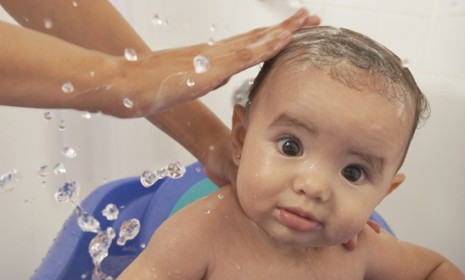Are baby shampoos poisoning infants?
Consumer groups boycott Johnson & Johnson after finding trace levels of potentially dangerous chemicals in the iconic Johnson's Baby Shampoo

A free daily email with the biggest news stories of the day – and the best features from TheWeek.com
You are now subscribed
Your newsletter sign-up was successful
A coalition of consumer advocates and health watchdogs is urging Americans to boycott Johnson & Johnson. The company's alleged crime: Continuing to sell Johnson's Baby Shampoo containing cancer-causing chemicals, even though the product has been pulled from the shelves in other countries. What parents need to know:
What are these toxic chemicals?
The first, dioxane, is "a likely carcinogen" that is "a byproduct of a process for making chemicals more soluble and gentler on the skin," reports the Associated Press. The second is a preservative called quaternium-15, which releases formaldehyde to kill bacteria. Formaldehyde "was declared a known human carcinogen" this year. The shampoo complies with government standards, but babies are more vulnerable to exposure than adults, says Tracey J. Woodruff, director of the Program on Reproductive Health and the Environment at University of California-San Francisco. "Even though the chemicals may be low-level, why risk it?"
The Week
Escape your echo chamber. Get the facts behind the news, plus analysis from multiple perspectives.

Sign up for The Week's Free Newsletters
From our morning news briefing to a weekly Good News Newsletter, get the best of The Week delivered directly to your inbox.
From our morning news briefing to a weekly Good News Newsletter, get the best of The Week delivered directly to your inbox.
So consumer groups are pushing a boycott?
In a new report called "Baby's Tub is Still Toxic," the Campaign for Safe Cosmetics says that bottles of Johnson's Baby Shampoo still contain trace amounts of the carcinogenic chemicals, even though the company offers versions without them in other countries and the Campaign for Safe Cosmetics has been urging Johnson & Johnson to remove these chemicals from its baby products for more than two years. "It's clearly a double standard," Lisa Archer, the group's director, tells the Associated Press, "something they can easily fix."
What does the company say?
Johnson & Johnson says it is changing the formulas of its baby products to reduce dioxane content below detectable levels. It also says that formaldehyde-releasing preservatives are safe and have been approved by regulators in the U.S. and elsewhere, but it's still phasing them out. "We know that some consumers are concerned about formaldehyde," the company said in a statement, "which is why we offer many products without formaldehyde-releasing preservatives." Johnson & Johnson already makes a new, more expensive alternative to its traditional baby shampoo called Johnson's Naturals that doesn't contain the chemicals.
A free daily email with the biggest news stories of the day – and the best features from TheWeek.com
If it's phasing out the carcinogens, why boycott?
The Campaign for Safe Cosmetics' wants to know exactly when the company will eliminate the chemicals completely. And Johnson & Johnson might be unusually sensitive to such pressure. Less than a month ago, the company ranked as the most trusted brand in America in a Forbes survey, so its executives might be worried this controversy "could give consumers pause," says Amy Westervelt at Forbes.
Sources: Associated Press, Forbes, Reuters
-
 6 of the world’s most accessible destinations
6 of the world’s most accessible destinationsThe Week Recommends Experience all of Berlin, Singapore and Sydney
-
 How the FCC’s ‘equal time’ rule works
How the FCC’s ‘equal time’ rule worksIn the Spotlight The law is at the heart of the Colbert-CBS conflict
-
 What is the endgame in the DHS shutdown?
What is the endgame in the DHS shutdown?Today’s Big Question Democrats want to rein in ICE’s immigration crackdown